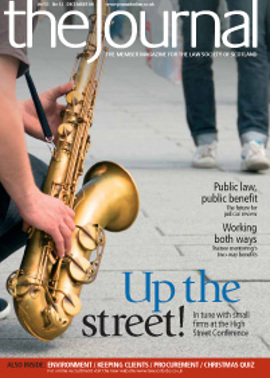Terms of Business Guidance Note (November 2008)
Terms of Business Guidance Note (November 2008)
In the light of the recent uncertainty about the future of banks, the Society sought the opinion of the Dean of Faculty on a range of matters. That opinion has now been obtained and can be summarised as follows:
Common law duties of accounting for client funds
In the Dean’s view the basic duty is that of the solicitor of ordinary skill acting with ordinary care as set out in Hunter v Hanley 1955 SC 200. The contract of agency between solicitor and client is fiduciary, but in the Dean’s view that does not equate to an absolute duty to account to clients for client funds which have been deposited in accordance with the Society’s Accounts Rules. If the solicitor has actual or constructive knowledge of a material risk of failure of a particular bank, a question of negligence might arise.
In the Society’s view, actual or constructive knowledge of a material risk of failure means such knowledge of a specific and material risk for a bank. Mere knowledge of speculation in the media or on the internet would be unlikely to amount to actual or constructive knowledge.
The Accounts Rules
In response to the suggestion that the Society’s Accounts Rules, and in particular rule 4(3)(b), create an obligation to guarantee clients’ funds, the Dean confirmed that such an obligation is not created by the Accounts Rules. The wording in rule 4(3)(b), “nothing herein contained shall relieve a solicitor of his responsibilities”, must refer to responsibilities to be found elsewhere and not within the Accounts Rules.
Terms of business
In the light of the Dean’s opinion and having regard to his advice, the Professional Practice Committee agreed that further guidance on terms of business is appropriate. Solicitors should advise clients in their standard terms of business of the identity of the bank or banks in which any funds held for the client will be deposited. The terms of business should further say that if clients wish their funds to be deposited in a different bank or banks, they will need to give the solicitors specific instructions to that effect.
In this issue
- Sale and purchase agreements – how to avoid the unexpected
- 2008: a year of change; 2009: a year for progress
- Law: it's the business
- Business makeover
- Training plus
- Registers update
- Public service
- One of a kind
- Brussels sprouts more eco-law
- Test yourself
- Trainees try again
- Terms of Business Guidance Note (November 2008)
- Guideline: Scanning and Archiving Documents (November 2008)
- Client, or customer?
- The changing faces of fraud
- Business advice roundup
- The year that crunched
- The anatomy of law firm failures
- Chapter and verse
- The power of agreement
- Under a cloud
- Scottish Solicitors' Discipline Tribunal
- ECJ in the fast lane
- Website review
- Book reviews
- Tender trouble
- Opportunity beckons, Smart tells symposium
- Public money or bust?






